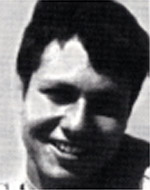Son of Tzippora and Dov, was born on the 17th of Sivan 5760 (17.6.1960) in Ramat Gan. Dodi grew up in the paratroopers’ apartment and studied at the Arnon Elementary School. He graduated summa cum laude, a model student and exemplary behavior. Dodi continued his studies at the Blich High School in the sociological track. He was a disciplined student, preparing his lessons seriously and devoted his leisure time to sports. My uncle began to stand out as a sportsman and was chosen to represent his school on the basketball team. During his high school years, he traveled extensively in Israel and began to discover love for nature and landscape photography. He was very charmed by the expanses of Sinai, and he joined the “Society for the Protection of Nature” trips. My uncle loved the sunsets and sunsets, the waves of the sea and the mountains and canyons. In the period between the high school and the IDF, Dodi prepared himself physically and emotionally for military service, which he saw as a challenge and not a duty. “When I think of the service I feel a chill of special excitement … Although I have not yet put on a uniform I can feel the feeling of pride and readiness Every evening Dodi used to run for good physical fitness, and he set out to know thoroughly the various areas of the Land of Israel and to add to his knowledge important courses in geography, the history of the Jewish people and the issues He believed that the IDF needs people of high quality, people who are rooted, who feel the feeling of Belonging to the state. In a letter to the commander of the enlistment office, Dodi wrote: “I am sincerely interested in and believe in my ability to volunteer and to contribute from my being a true contribution to the IDF and the homeland.” Dodi, the tall, sensitive boy, did not talk much about himself. And in November 1978 he enlisted in the IDF and was stationed in the Armored Corps. The transition from the warm and loving home to the atmosphere of commands and reference to numbers rather than to people, was not to his liking. From there he wrote: “The cakes are over and with them the smell of the house has run out.” “The rain that goes down is not only a blessing for Mother Earth, but also for recruits, and it allows for rest, conversation and, most importantly, thought, the newspapers I brought home do not have time to read and it makes me very angry.” The book was the basic equipment put into his pack. Despite medical limitations, Dodi did everything to keep him in the combat unit. “The role that was offered to me makes me feel that I have not fulfilled my expectations and demands of myself, hence the feeling of frustration and disappointment.” With great willpower, Dodi overcame the physical limitations. He moved from course to course and completed his officers’ course in July 1980. For a while he served as platoon commander, and in November 1981 he was promoted to lieutenant and was appointed deputy commander of an armored company. As an officer, Dodi believed, he must serve as a model for his subordinates, not in words but in deeds. He did not keep away from his subordinates, and always gave them a shoulder. He loved the man and hated the bureaucracy. One of his friends wrote: “We loved Dodi because of his humanity, because he was a friend of all, and he patted his back in distress, helped and gave his own. When the Peace for Galilee War broke out on June 6, 1982, Dodi was with the force that broke into Lebanon. On Wednesday, 18 June 1982, a battle took place in Ein Zahlata, on the road leading to the Beirut-Damascus highway. Dodi tank, which was among the first of the leading column, was hit by an ambush by a Syrian commando with an RPG missile. Dodi fell, and he was 22 years old. He was laid to rest at the military cemetery in Kiryat Shaul in Tel Aviv. Dodi left behind his parents, my brother Roni and my sister Noa. His parents and friends published a pamphlet in his memory. One of his commanders wrote: “His demands were more severe than himself and his soldiers, as a soldier he was a disciplined soldier, but he did not profess blind discipline, and every command he would not have thought would have been heatedly argued, but he always performed it in the best way, even if he did not like it “He said. The commander of the unit wrote: “My conscientious Dodi, who cares about everything and resents everything that seems to him to be unjust, was very prominent in his last position – a deputy company commander in the Tzamach company.
